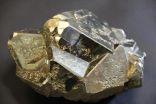(Press-News.org) PROVIDENCE, R.I. [Brown University] -- For such humble creatures, single-celled paramecia have remarkable sensory systems. Give them a sharp jab on the nose, they back up and swim away. Jab them in the behind, they speed up their swimming to escape. But according to new research, when paramecia encounter flat surfaces, they're at the mercy of the laws of physics.
The findings, published in the journal Physical Review Letters, come from some surprising results in research performed in recent years by James Valles, professor and chair of physics at Brown University, and his students.
The group has been working to understand how paramecia react to changes in their buoyancy. The experiments are done by adding tiny magnetic particles to the water in which the creatures swim, and then applying a powerful magnet. When the water is pulled downward by the magnet, the paramecia become more buoyant and float more easily. Pull the water up, and the creatures become less buoyant.
The initial research, published a few years ago, showed that paramecia have a remarkable ability to sense the changes in their buoyancy and adjust their swimming behavior accordingly.
"We found that if we made them sink more by making them less buoyant, they would try to swim harder against that sinking," Valles said. The effect was the same when the creatures were made more buoyant; they swam harder against the tendency to float.
But over the course of the experiments, a strange thing happened. When their buoyancy was increased, meaning the paramecia should float more easily, the creatures would eventually get stuck to the lower surface of their enclosure. When the researchers reversed the experiment, making the paramecia less buoyant, they got stuck at the top.
"It was so striking," said Valles, who performed the latest experiments with graduate student Ilyong Jung and Karine Guevorkian of the Institut de Génétique et de Biologie Moléculaire et Cellulaire in France. "They looked like bats hanging from the top of a cave."
To understand this counterintuitive phenomenon, Valles and his colleagues watched paramecia swim into surfaces both under normal buoyancy as well as with buoyancy altered. Under normal circumstances, the paramecia skitter along the surface briefly before turning and swimming away. But when buoyancy was increased, they failed to complete the turn, leaving them stuck at an angle against the lower surface.
The researchers determined that what they were seeing could be explained entirely by Newton's Third Law of Motion. When the creatures push against a surface, the surface pushes back with equal force. Under normal circumstances that force is enough to cause the creatures to turn, enabling them to swim away. But when their buoyancy is increased, paramecia don't hit the lower surface with as much force, which means the force applied back to them is also reduced.
"As they turn, that force of the wall acting on them gets smaller and smaller because they're swimming at an angle against the surface," Valles said. "It turns out that when buoyancy is altered, there's an angle at which that force goes to zero before they complete the turn."
And so there they stay, stuck at that angle against the surface.
The results are surprising, Valles said, because it implies that paramecia don't respond to contact with surfaces by actively changing their swimming behavior -- even though they have the ability to respond actively when poked and prodded.
"Paramecia are interesting to people because they're like swimming nerve cells -- they have this surprisingly complex force-sensing network," Valles said. "But it appears as if it's not necessary for them to use it for simple navigation."
The findings raise some interesting evolutionary questions, Valles said.
"Fish and other higher organisms actively navigate," he said. "But being passive apparently works just fine for paramecia; they're in every pond you come across. The question that's interesting to me is when in evolutionary history did a more active navigation become advantageous?"
INFORMATION:
University of Otago palaeontologists are rewriting the history of New Zealand's ancient whales by describing a previously unknown genus of fossil baleen whales and two species within it.
Otago Department of Geology PhD student Robert Boessenecker and his supervisor Professor Ewan Fordyce have named the new genus Tohoraata, which translates as 'Dawn Whale' in Māori.
The two whales, which lived between 27-25 million years ago, were preserved in a rock formation near Duntroon in North Otago. At that time the continent of Zealandia was largely or completely under ...
MADISON, Wis. - As the installation of photovoltaic solar cells continues to accelerate, scientists are looking for inexpensive materials beyond the traditional silicon that can efficiently convert sunlight into electricity.
Theoretically, iron pyrite -- a cheap compound that makes a common mineral known as fool's gold -- could do the job, but when it works at all, the conversion efficiency remains frustratingly low. Now, a University of Wisconsin-Madison research team explains why that is, in a discovery that suggests how improvements in this promising material could ...
The most emergent form of heart attacks is decreasing nationwide, but this declining incidence could affect emergency departments' quality and timeliness of care.
This is the key finding of a Vanderbilt University study released today in the American Journal of Cardiology and presented at the national American Heart Association meeting in Chicago this week.
Using data from the Nationwide Emergency Department Sample, the nation's largest database of information about emergency department visits, the researchers found that approximately 250,000 patients present in emergency ...
Philadelphia, PA, November 18, 2014 - Care gaps are emerging due to disharmony between healthcare reimbursement policies and evidence-based clinical guideline recommendations, cautions a group of Canadian physicians. Writing in the Canadian Journal of Cardiology, they use the example of stroke prevention in atrial fibrillation (AF) to make a case for engaging with policy-makers to address the growing barriers to patients' access to optimal care.
Stroke is a costly disease, imposing a significant human, societal, and economic burden. AF affects about one in eight people ...
Computerized cognitive training (CCT) has been widely promoted for older adults, but its effectiveness for cognitively health older adults has been unclear in systematic reviews to date. In a new systematic review and meta-analysis published in this week's issue of PLOS Medicine, Michael Valenzuela (Brain and Mind Research Institute, University of Sydney, Sydney, New South Wales, Australia) and colleagues evaluated 52 datasets in 51 studies and found a small overall effect of CCT (g = 0.22; 95% CI 0.15 to 0.29, where g END ...
Computer based 'brain training' can boost memory and thinking skills in older adults, but many programs promoted by the $1 billion brain training industry are ineffective, reveals new research by the University of Sydney.
Published today in PLOS Medicine, the study shows that engaging older adults computer-based cognitive training (also known as brain training) can lead to improvements in memory, speed, and visuospatial skills.
However, it has no impact on attention or executive functions such as impulse control, planning and problem solving.
Brain degeneration ...
HOUSTON, Nov. 18, 2014 - The quest of University of Houston professor Richard Meisel to understand how and why males and females differ may one day lead to a more effective means of pest control - namely, the pesky house fly.
Meisel, an assistant professor in the UH Department of Biology and Biochemistry, collaborated with several scientists on sequencing the house fly genome. The results were recently published in the open-access journal Genome Biology.
"The house fly genome will be a useful resource for understanding how pest species are able to exist in their environment ...
WASHINGTON, DC-- Small volcanic eruptions might eject more of an atmosphere-cooling gas into Earth's upper atmosphere than previously thought, potentially contributing to the recent slowdown in global warming, according to a new study.
Scientists have long known that volcanoes can cool the atmosphere, mainly by means of sulfur dioxide gas that eruptions expel. Droplets of sulfuric acid that form when the gas combines with oxygen in the upper atmosphere can remain for many months, reflecting sunlight away from Earth and lowering temperatures. However, previous research ...
EUGENE, Ore. -- Nov. 18, 2014 -- Leave it to long-dead short-tailed shrew and flying squirrels to outfox climate-modelers trying to predict future habitats.
Evidence from the fossil record shows that gluttonous insect-eating shrew didn't live where a species distribution technique drawn by biologists put it 20,000 years ago to survive the reach of glaciers, says University of Oregon geologist Edward B. Davis. The shrew is not alone.
According to a new study by Davis and colleagues, fossil records of five ancient mammalian species that survived North America's last glacial ...
Hamilton, ON (Nov. 18, 2014) - McMaster University researchers have found new evidence that suggests patients with a history of adverse reaction to the blood thinner heparin may be ready for urgent heart surgery sooner with a combination of appropriate blood screenings and therapeutic plasma exchange.
The study was published online today in Blood, the journal of the American Society of Hematology. The lead author is Dr. Theodore Warkentin, a professor in the Department of Medicine's Division of Hematology and Thromboembolism and the Department of Pathology and Molecular ...




